2018年高考英语全国卷1听力原文分析
2018年高考英语全国卷1 word版 含参考答案及解析
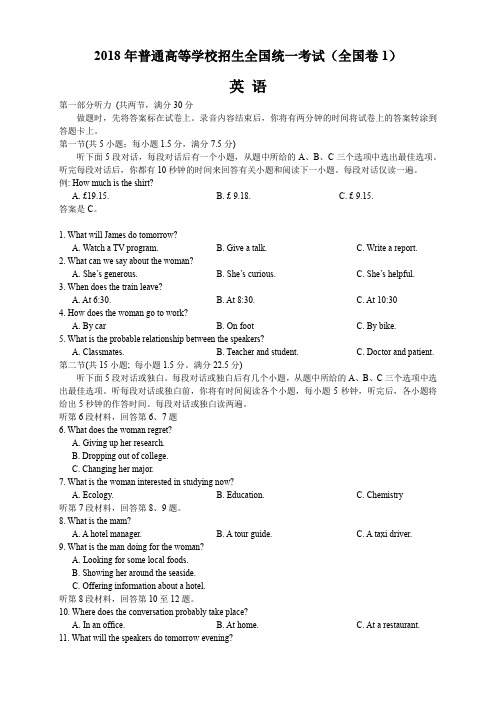
2018年普通高等学校招生全国统一考试(全国卷1)英语第一部分听力(共两节,满分30分做题时,先将答案标在试卷上。
录音内容结束后,你将有两分钟的时间将试卷上的答案转涂到答题卡上。
第一节(共5小题;每小题1.5分,满分7.5分)听下面5段对话,每段对话后有一个小题,从题中所给的A、B、C三个选项中选出最佳选项。
听完每段对话后,你都有10秒钟的时间来回答有关小题和阅读下一小题。
每段对话仅读一遍。
例: How much is the shirt?A. £19.15.B. £ 9.18.C. £ 9.15.答案是C。
1. What will James do tomorrow?A. Watch a TV program.B. Give a talk.C. Write a report.2. What can we say about the woman?A. She’s generous.B. She’s curious.C. She’s helpful.3. When does the train leave?A. At 6:30.B. At 8:30.C. At 10:304. How does the woman go to work?A. By carB. On footC. By bike.5. What is the probable relationship between the speakers?A. Classmates.B. Teacher and student.C. Doctor and patient.第二节(共15小题; 每小题1.5分。
满分22.5分)听下面5段对话或独白。
每段对话或独白后有几个小题,从题中所给的A、B、C三个选项中选出最佳选项。
听每段对话或独白前,你将有时间阅读各个小题,每小题5秒钟,听完后,各小题将给出5秒钟的作答时间。
每段对话或独白读两遍。
2018年高考英语(全国I卷)试题及答案附听力原文和音频
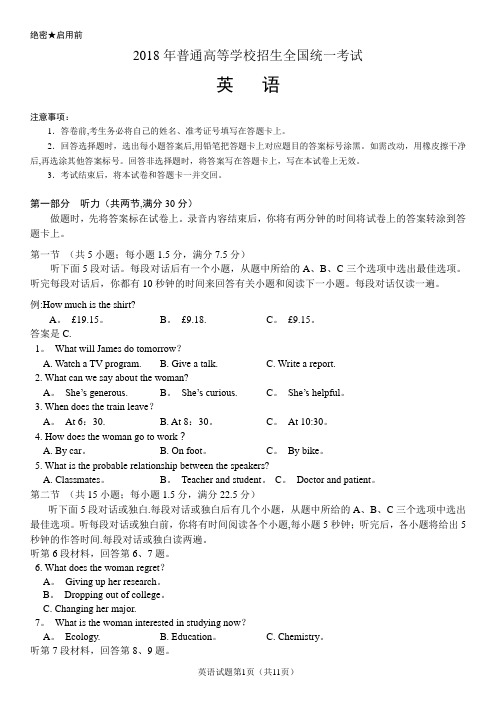
绝密★启用前2018年普通高等学校招生全国统一考试英语注意事项:1.答卷前,考生务必将自己的姓名、准考证号填写在答题卡上。
2.回答选择题时,选出每小题答案后,用铅笔把答题卡上对应题目的答案标号涂黑。
如需改动,用橡皮擦干净后,再选涂其他答案标号。
回答非选择题时,将答案写在答题卡上,写在本试卷上无效。
3.考试结束后,将本试卷和答题卡一并交回。
第一部分听力(共两节,满分30分)做题时,先将答案标在试卷上。
录音内容结束后,你将有两分钟的时间将试卷上的答案转涂到答题卡上。
第一节(共5小题;每小题1.5分,满分7.5分)听下面5段对话。
每段对话后有一个小题,从题中所给的A、B、C三个选项中选出最佳选项。
听完每段对话后,你都有10秒钟的时间来回答有关小题和阅读下一小题。
每段对话仅读一遍。
例:How much is the shirt?A。
£19.15。
B。
£9.18. C。
£9.15。
答案是C.1。
What will James do tomorrow?A. Watch a TV program.B. Give a talk.C. Write a report.2. What can we say about the woman?A。
She’s generous.B。
She’s curious.C。
She’s helpful。
3. When does the train leave?A。
At 6:30. B. At 8:30。
C。
At 10:30。
4. How does the woman go to work?A. By car。
B. On foot。
C。
By bike。
5. What is the probable relationship between the speakers?A. Classmates。
B。
Teacher and student。
C。
Doctor and patient。
2018全国卷1高考英语听力真题(含原文-答案-MP3)

例:How much is the shirt?A. £19. 15.B. £9. 18.C. £9. 15.答案是C。
1. What does John find difficult in learning German?A. Pronunciation.B. Vocabulary.C. Grammar.2. What is the probable relationship between the speakers?A. Colleagues.B. Brother and sister.C. Teacher and student.3. Where does the conversation probably take place?A. In a bank.B. At a ticket office.C. On a train.4. What are the speakers talking about?A. A restaurant.B. A street.C. A dish.5. What does the woman think of her interview?A. It was tough.B. It was interesting.C. It was successful.第二节(共15小题;每小题1.5分,满分22.5分)听下面5段对话或独白。
每段对话或独白后有几个小题,从题中所给的A、B、C三个选项中选出最佳选项。
听每段对话或独白前,你将有时间阅读各个小题,每小题5秒钟;听完后,各小题将给出5秒钟的作答时间。
每段对话或独白读两遍。
听第6段材料,回答第6、7题。
6. When will Judy go to a party?A. On Monday.B. On Tuesday.C. On Wednesday.7. What will Max do next?A. Fly a kite.B. Read a magazine.C. Do his homework.听第7段材料,回答第8、9题。
2018 高考英语 全国卷 1听力试题及原文

2018年普通高等学校招生全国统一考试英语卷1第一部分听力(共两节,满分30分)第一节(共5小题;每小题1.5分,满分7.5分)1.What will James do tomorrow ?A.Watch a TV program.B.Give a talk.C.Writea report.2.What can we say about the woman?A.She's generous.B.She's curious.C.She's helpful.3.When does the train leave?A.At 6:30.B.At 8:30.C.At 10:30.4.How does the woman go to work?A.By car.B.On foot.C.By bike.5.What is the probable relationship between the speakers?A.Classmates.B.Teacher and student.C.Doctor and patient.第二节(共15小题;每小题1.5分,满分22.5分)听第6段材料,回答第6、7题。
6.What does the woman regret?A.Giving up her research.B.Dropping out of college.C.Changing her major.7.What is the woman interested in studying now?A.Ecology.cation.C.Chemistry.听第7段材料,回答第8、9题。
8.What is the man?A.A hotel manager.B.A tour guide.C.A taxi driver.9.What is the man doing for the woman?A.Looking for some local foods.B.Showing her around the seaside.C.Offering information about a hotel.听第8段材料,回答第10至12题。
2018年全国统一高考英语试卷(新课标ⅰ)含详细答案解析

2018年全国统一高考英语试卷(新课标Ⅰ)第一部分听力(共两节)做题时,先将答案标在试卷上.录音内容结束后,你将有两分钟的时间将试卷上的答案转涂到答题卡上.第一节(共5小题;每小题1.5分,满分7.5分)听下面5段对话.每段对话后有一个小题,从题中所给的A、B、C三个选项中选出最佳选项.听完每段对话后,你都有10秒钟的时间来冋答有关小题和阅读下一小题.每段对话仅读一遍.例:How much is the shirt?A.£19.15.B. £9.18. C £9.15.答案是C。
1.(1.50分)What will James do tomorrow?A.Watch a TV program.B.Give a talk.C.Write a report.2.(1.50分)What can we say about the woman?A.She's generous.B.She's curious.C.She's helpful.3.(1.50分)When does the train leave?A.At 6:30.B.At 8:30.C.At 10:30.4.(1.50分)How does the woman go to work?A.By car.B.On foot.C.By bike.5.(1.50分)What is the probable relationship between the speakers?A.Classmates.B.Teacher and student.C.Doctor and patient.第二节(每小题1.5分,满分22.5分)听下面5段对话或独白.每段对话或独白后有几个小题,从题中所给的A、B、C、D三个选项中选出最佳选项.听每段对话或独白前,你将有时间阅读各个小题,每小题5秒钟;听完后,各小题将给出5秒钟的作答时间.毎段对话或独白读两遍.6.(3.00分)听第6段材料,回答下列各题.(1)What does the woman regret?A.Giving up her research.B.Dropping out of college.C.Changing her major.(2)What is the woman interested in studying now?A.Ecology.B.Education.C.Chemistry.7.(3.00分)听第7段材料,回答下列各题.(1)What is the man?A.A hotel manager.B.A tour guide.C.A taxi driver.(2)What is the man doing for the woman?A.Looking for some local foods.B.Showing her around the seaside.C.Offering information about a hotel.8.(4.50分)听第8段材料,回答下列各题.(1)Where does the conversation probably take place?A.In an office.B.At home.C.At a restaurant.(2)What will the speakers do tomorrow evening?A.Go to a concert.B.Visit a friend.C.Work extra hours.(3)Who is Alice going to call?A.Mike.B.Joan.C.Catherine.9.(6.00分)听第9段材料,回答下列各题.(1)Why does the woman meet the man?A.To look at an apartment.B.To deliver some furniture.C.To have a meal together.(2)What does the woman like about the carpet?A.Its color.B.Its design.C.Its quality.(3)What does the man say about the kitchen?A.It's a good size.B.It's newly painted.C.It's adequately equipped.(4)What will the woman probably do next?A.Go downtown.B.Talk with her friend.C.Make payment.10.(6.00分)听第10段材料,回答下列各题.(1)Who is the speaker probably talking to?A.Movie fans.B.News reporters.C.College students.(2)When did the speaker take English classes?A.Before he left his hometown.B.After he came to America.C.When he was 15 years old.(3)How does the speaker feel about his teacher?A.He's proud.B.He's sympathetic.C.He's grateful.(4)What does the speaker mainly talk about?A.How education shaped his life.B.How his language skills improved.C.How he managed his business well.第二部分阅读理解(共两节)第一节(满分30分)阅读下列短文,从每题所给的A、B、C和D四个选项中,选出最佳选项.11.(6.00分)AWashington,D.C.Bicycle ToursCherry Blossom Bike Tour in Washington,D.C.Duration:3 hoursThis small group bike tour is a fantastic way to see the world﹣famous cherry trees with beautiful flowers of Washington,D.C.Your guide will provide a history lesson about the trees and the famous monuments where they blossom.Reserve your spot before availability ﹣and the cherry blossoms ﹣disappear! Washington Capital Monuments Bicycle TourDuration:3 hours (4 miles)Join a guided bike tour and view some of the most popular monuments in Washington,D.C.Explore the monuments and memorials on the National Mall as your guide shares unique facts and history at each stop.Guided tour includes bike,helmet,cookies and bottled water.Capital City Bike Tour in Washington,D.C.Duration:3 hoursMorning or Afternoon,this bike tour is the perfect tour for D.C.newcomers and locals looking to experience Washington,D.C.in a healthy way with minimum effort.Knowledgeable guides will entertain you with the most interesting stories about Presidents,Congress,memorials,and parks.Comfortable bikes and a smooth tour route(路线)make cycling between the sites fun and relaxing.Washington Capital Sites at Night Bicycle TourDuration:3 hours (7 miles)Join a small group bike tour for an evening of exploration in the heart of Washington,D C.Get up close to the monuments and memorials as you bike the sites of Capitol Hill and the National Mall.Frequent stops are made for photo taking as your guide offers unique facts and history.Tour includes bike,helmet,and bottled water.All riders are equipped with reflective vests and safety lights.(1)Which tour do you need to book in advance?A.Cherry Blossom Bike Tour in Washington,D.C.B.Washington Capital Monuments Bicycle Tour.C.Capital City Bike Tour in Washington,D.C.D.Washington Capital Sites at Night Bicycle Tour.(2)What will you do on the Capital City Bike Tour?A.Meet famous people.B.Go to a national park.C.Visit well﹣known museums.D.Enjoy interesting stories.(3)Which of the following does the bicycle tour at night provide?A.City maps.B.Cameras.C.Meals.D.Safety lights.12.(8.00分)BGood Morning Britain's Susanna Reid is used to grilling guests on the sofa every morning,but she is cooking up a storm in her latest role ﹣showing families how to prepare delicious and nutritious meals on a tight budget.In Save Money:Good Food,she visits a different home each week and with the help of chef Matt Tebbutt offers top tips on how to reduce food waste,while preparing recipes for under £5 per family a day.And the Good Morning Britain presenter says she's been able to put a lot of what she's learnt into practice in her own home,preparing meals for sons,Sam,14,Finn,13,and Jack,11."We love Mexican churros,so I buy them on my phone from my local Mexican takeaway restaurant,'' she explains,"I pay £5 for a portion(一份),but Matt makes them for 26p a portion,because they are flour,water,sugar and oil.Everybody can buy takeaway food,but sometimes we're not aware how cheaply we can make this food ourselves."The eight﹣part series (系列节目),Save Money:Good Food,follows in the footsteps of ITV's Save Money:Good Health,which gave viewers advice on how to get value from the vast range of health products on the market.With food our biggest weekly household expense.Susanna and Matt spend time with a different family each week.In tonight's Easter special they come to the aid of a family in need of some delicious inspiration on a budget.The team transforms the family's long weekend of celebration with less expensive but still tasty recipes.(1)What do we know about Susanna Reid?A.She enjoys embarrassing her guests.B.She has started a new programme.C.She dislikes working early in the morning.D.She has had a tight budget for her family.(2)How does Matt Tebbutt help Susanna?A.He buys cooking materials for her.B.He prepares food for her kids.C.He assists her in cooking matters.D.He invites guest families for her.(3)What does the author intend to do in paragraph 4?A.Summarize the previous paragraphs.B.Provide some advice for the readers.C.Add some background information.D.Introduce a new topic for discussion.(4)What can be a suitable title for the text?A.Keeping Fit by Eating SmartB.Balancing Our Daily DietC.Making Yourself a Perfect ChefD.Cooking Well for Less13.(8.00分)CLanguages have been coming and going for thousands of years,but in recent times there has been less coming and a lot more going.When the world was still populated by hunter﹣gatherers,small,tightly knit (联系)groups developed their own patterns of speech independent of each other.Some language experts believe that 10,000 years ago,when the world had just five to ten million people,they spoke perhaps 12,000 languages between them.Soon afterwards,many of those people started settling down to become farmers,and their languages too became more settled and fewer in number.In recent centuries,trade,industrialisation,the development of the nation﹣state and the spread of universal compulsory education,especially globalisation andbetter communications in the past few decades,all have caused many languages to disappear,and dominant languages such as English,Spanish and Chinese are increasingly taking over.At present,the world has about 6,800 languages.The distribution of these languages is hugely uneven.The general rule is that mild zones have relatively few languages,often spoken by many people,while hot,wet zones have lots,often spoken by small numbers.Europe has only around 200 languages;the Americas about 1,000;Africa 2,400;and Asia and the Pacific perhaps 3,200,of which Papua New Guinea alone accounts for well over 800.The median number (中位数)of speakers is a mere 6,000,which means that half the world's languages are spoken by fewer people than that.Already well over 400 of the total of 6,800 languages are close to extinction (消亡),with only a few elderly speakers left.Pick,at random,Busuu in Cameroon (eight remaining speakers),Chiapaneco in Mexico (150),Lipan Apache in the United States (two or three)or Wadjigu in Australia (one,with a question﹣mark):none of these seems to have much chance of survival.(1)What can we infer about languages in hunter﹣gatherer times?A.They developed very fast.B.They were large in number.C.They had similar patterns.D.They were closely connected.(2)Which of the following best explains "dominant" underlined in paragraph 2?A.Complex.B.Advanced.C.Powerful.D.Modern.(3)How many languages are spoken by less than 6,000 people at present?A.About 6,800.B.About 3,400.C.About 2,400.D.About 1,200.(4)What is the main idea of the text?A.New languages will be created.B.People's lifestyles are reflected in languages.C.Human development results in fewer languages.D.Geography determines language evolution.14.(8.00分)DWe may think we're a culture that gets rid of our worn technology at the first sight of something shiny and new,but a new study shows that we keep using our old devices (装置)well after they go out of style.That's bad news for the environment ﹣and our wallets ﹣as these outdated devices consume much more energy than the newer ones that do the same things.To figure out how much power these devices are using,Callie Babbitt and her colleagues at the Rochester Institute of Technology in New York tracked the environmental costs for each product throughout its life ﹣from when its minerals are mined to when we stop using the device.This method provided a readout for how home energy use has evolved since the early 1990s.Devices were grouped by generation.Desktop computers,basic mobile phones,and box﹣set TVs defined 1992.Digital cameras arrived on the scene in 1997.And MP3 players,smart phones,and LCD TVs entered homes in 2002,before tablets and e﹣readers showed up in 2007.As we accumulated more devices,however,we didn't throw out our old ones."The living﹣room television is replaced and gets planted in the kids' room,and suddenly one day,you have a TV in every room of the house," said one researcher.The average number of electronic devices rose from four per household in 1992 to 13 in 2007.We're not just keeping these old devices﹣we continue touse them.According to the analysis of Babbitt's team,old desktop monitors and box TVs with cathode ray tubes are the worst devices with their energy consumption and contribution to greenhouse gas emissions (排放)more than doubling during the 1992 to 2007 window.So what's the solution(解决方案)?The team's data only went up to 2007,but the researchers also explored what would happen if consumers replaced old products with new electronics that serve more than one function,such as a tablet for word processing and TV viewing.They found that more on﹣demand entertainment viewing on tablets instead of TVs and desktop computers could cut energy consumption by 44%.(1)What does the author think of new devices?A.They are environment﹣friendly.B.They are no better than the old.C.They cost more to use at home.D.They go out of style quickly.(2)Why did Babbitt's team conduct the research?A.To reduce the cost of minerals.B.To test the life cycle of a product.C.To update consumers on new technology.D.To find out electricity consumption of the devices.(3)Which of the following uses the least energy?A.The box﹣set TV.B.The tablet.C.The LCD TV.D.The desktop computer.(4)What does the text suggest people do about old electronic devices?A.Stop using them.B.Take them apart.C.Upgrade them.D.Recycle them.第二节(毎小题2分,满分10分)根据短文内容,从短文后的选项中选出能填入空白处的最佳选项.选项中有两项为多余选项。
(完整版)2018年高考英语全国1卷(附答案和听力原文)
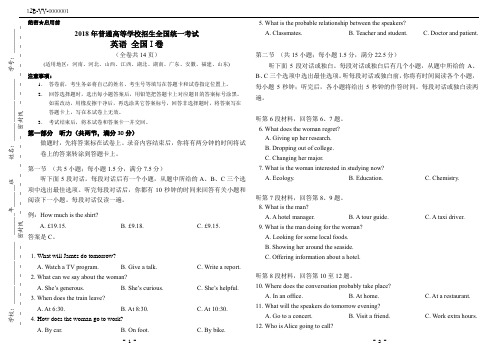
学校:____________________ _______年_______班 姓名:____________________ 学号:________- - - - - - - - - 密封线 - - - - - - - - - 密封线 - - - - - - - - -绝密★启用前2018年普通高等学校招生全国统一考试英语 全国I 卷(全卷共14页)(适用地区:河南、河北、山西、江西、湖北、湖南、广东、安徽、福建、山东) 注意事项:1.答卷前,考生务必将自己的姓名、考生号等填写在答题卡和试卷指定位置上。
2. 回答选择题时,选出每小题答案后,用铅笔把答题卡上对应题目的答案标号涂黑。
如需改动,用橡皮擦干净后,再选涂其它答案标号,回答非选择题时,将答案写在答题卡上,写在本试卷上无效。
3.考试结束后,将本试卷和答案卡一并交回。
第一部分 听力(共两节,满分30分)做题时,先将答案标在试卷上。
录音内容结束后,你将有两分钟的时间将试卷上的答案转涂到答题卡上。
第一节 (共5小题;每小题1.5分,满分7.5分)听下面5段对话。
每段对话后有一个小题,从题中所给的A 、B 、C 三个选项中选出最佳选项。
听完每段对话后,你都有10秒钟的时间来回答有关小题和阅读下一小题。
每段对话仅读一遍。
例:How much is the shirt?A. £19.15.B. £9.18.C. £9.15.答案是C 。
1. What will James do tomorrow? A. Watch a TV program. B. Give a talk. C. Write a report.2. What can we say about the woman?A. She’s generous.B. She’s curious.C. She’s helpful.3. When does the train leave? A. At 6:30. B. At 8:30. C. At 10:30.4. How does the woman go to work?A. By car.B. On foot.C. By bike.5. What is the probable relationship between the speakers?A. Classmates.B. Teacher and student.C. Doctor and patient.第二节 (共15小题;每小题1.5分,满分22.5分)听下面5段对话或独白。
2018年高考英语全国卷I听力试题评析

2018年高考英语全国卷I听力试题评析nAfter the n of the 2018 nal College XXX。
the XXX an in-depth analysis of the XXX test in the nal College XXX。
the 2018 nal College XXX。
the language is authentic。
the themes are rich。
and the ns are rigorous。
scientific。
XXX。
XXX。
but also XXX skills。
critical thinking。
and learning ability。
XXX" in the 2017n of the "General High School English Curriculum Standard"。
XXX guidance ideas of "XXX。
guiding quality n。
XXX progress" in the "2018 nal College XXX" issued by the Ministry of XXX.This study is based on the 2017 n of the "General HighSchool English Curriculum Standard" and the theory of language testing。
In order to ensure the reliability of the test analysis。
all data analysis is based on the mode of two independent analyses。
XXX person。
XXX.Data Statistics and AnalysisIn order to help readers better XXX' learning efficiency。
2018全国卷1听力真题、原文及答案

2018全国卷1第一部分听力(共两节,满分30分)1. What will James do tomorrow?A. Watch a TV program.B. Give a talk.C. Write a report.2. What can we say about the woman?A. She’s generous.B. She’s curious.C. She’s helpful.3. When does the train leave?A. At 6:30.B. At 8:30.C. At 10:30.4. How does the woman go to work?A. By car.B. On foot.C. By bike.5. What is the probable relationship between the speakers?A. Classmates.B. Teacher and student.C. Doctor and patient.第二节(共15小题;每小题1.5分,满分22.5分)听第6段材料,回答第6、7题。
6. What does the woman regret?A. Giving up her research.B. Dropping out of college.C. Changing her major.7. What is the woman interested in studying now?A. Ecology.B. Education.C. Chemistry.听第7段材料,回答第8、9题。
8. What is the man?A. A hotel manager.B. A tour guide.C. A taxi driver.9. What is the man doing for the woman?A. Looking for some local foods.B. Showing her around the seaside.C. Offering information about a hotel.听第8段材料,回答第10至12题。
2018年高考英语全国1卷听力答案与分析

(全国Ⅰ卷)英语听力部分第一节(共5小题;每小题1.5分,满分7.5分)听下面5段对话。
每段对话后有一个小题,从题中所给的A、B、C三个选项中选出最佳选项。
听完每段对话后,你都有10秒钟的时间来回答有关小题和阅读下一小题。
每段对话仅读一遍。
例:How much is the shirt?A. £19. 15.B. £9. 18.C. £9. 15.答案是C。
1.What will James do tomorrow?A. Watch a TV program.B. Give a talk.C. Write a report.2.What can we say about the woman?A.She’s generous.B. She’s curious.C. She’s helpful.3.When does the train leave?A.At 6:30.B. At 8:30.C. At 10:30.4.How does the woman go to work?A.By car.B. On foot.C. By bike.5.What is the probable relationship between the speakers?A.Classmates.B.Teacher and student.C. Doctor and patient.第二节(共15小题;每小题1.5分,满分22.5分)听下面5段对话或独白。
每段对话或独白后有几个小题,从题中所给的A、B、C三个选项中选出最佳选项。
听每段对话或独白前,你将有时间阅读各个小题,每小题5秒钟;听完后,各小题将给出5秒钟的作答时间。
每段对话或独白读两遍。
听第6段材料,回答第6、7题。
6. What does the woman regret?A. Giving up her research.B. Dropping out of college.C. Changing her major.7. What is the woman interested in studying now?A. Ecology.B. Education.C. Chemistry.听第7段材料,回答第8、9题。
2018年高考英语全国卷1听力试题及原文
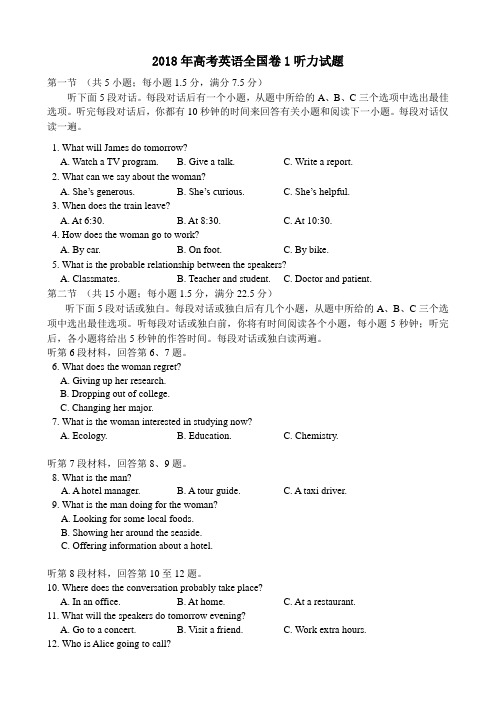
2018年高考英语全国卷1听力试题第一节(共5小题;每小题1.5分,满分7.5分)听下面5段对话。
每段对话后有一个小题,从题中所给的A、B、C三个选项中选出最佳选项。
听完每段对话后,你都有10秒钟的时间来回答有关小题和阅读下一小题。
每段对话仅读一遍。
1. What will James do tomorrow?A. Watch a TV program.B. Give a talk.C. Write a report.2. What can we say about the woman?A. She’s generous.B. She’s curious.C. She’s helpful.3. When does the train leave?A. At 6:30.B. At 8:30.C. At 10:30.4. How does the woman go to work?A. By car.B. On foot.C. By bike.5. What is the probable relationship between the speakers?A. Classmates.B. Teacher and student.C. Doctor and patient.第二节(共15小题;每小题1.5分,满分22.5分)听下面5段对话或独白。
每段对话或独白后有几个小题,从题中所给的A、B、C三个选项中选出最佳选项。
听每段对话或独白前,你将有时间阅读各个小题,每小题5秒钟;听完后,各小题将给出5秒钟的作答时间。
每段对话或独白读两遍。
听第6段材料,回答第6、7题。
6. What does the woman regret?A. Giving up her research.B. Dropping out of college.C. Changing her major.7. What is the woman interested in studying now?A. Ecology.B. Education.C. Chemistry.听第7段材料,回答第8、9题。
2018全国高考英语听力1-3卷听力及原文

2018年普通高等学校招生全国统一考试(全国I卷)英语第一部分听力(共两节, 满分30分)做题时, 先将答案标在试卷上。
录音内容结束后, 你将有两分钟的时间将试卷上的答案转涂到答题卡上。
第一节(共5小题;每小题1.5分, 满分7.5分)听下面5段对话。
每段对话后有一个小题, 从题中所给的A.B、C三个选项中选出最佳选项。
听完每段对话后, 你都有10秒钟的时间来回答有关小题和阅读下一小题。
每段对话仅读一遍。
例: How much is the shirt?A.£19.15.B.£9.18.C.£9.15.答案是C。
1.Wha.wil.Jame.d.tomorrow?A.Watc..T.program.B.Giv..talk.C.Writ..report.2.Wha.ca.w.sa.abou.th.woman?A.She’.generous.B.She’.curious.C.She’.helpful.3.Whe.doe.th.trai.leave?A.A.6:30.B.A.8:30.C.A.10:30.4.Ho.doe.th.woma.g.t.work?A.B.car. B.O.foot. C.B.bike.5.Wha.i.th.probabl.relationshi.betwee.th.speakers?A.Classmates.B.Teache.an.student.C.Docto.an.patient.第二节(共15小题;每小题1.5分, 满分22.5分)听下面5段对话或独白。
每段对话或独白后有几个小题, 从题中所给的A.B.C三个选项中选出最佳选项。
听每段对话或独白前, 你将有时间阅读各个小题, 每小题5秒钟;听完后, 各小题将给出5秒钟的作答时间。
每段对话或独白读两遍。
听第6段材料, 回答第6.7题。
6.Wha.doe.th.woma.regret?A.Givin.u.he.research.B.Droppin.ou.o.college.C.Changin.he.major.7.Wha.i.th.woma.intereste.i.studyin.now?A.Ecology.cation.C.Chemistry.听第7段材料, 回答第8、9题。
2018年高考全国I卷英语听力原文+答案(5页)

2018年普通高等学校招生全国统一考试I卷英语注意事项:1.答卷前,考生务必将自己的姓名、准考证号填写在答题卡上。
2.回答选择题时,选出每小题答案后,用铅笔把答题卡上对应题目的答案标号涂黑。
如需改动,用橡皮擦干净后,再选涂其他答案标号。
回答非选择题时,将答案写在答题卡上,写在本试卷上无效。
3.考试结束后,将本试卷和答题卡一并交回。
第一部分听力(共两节,满分30分)做题时,先将答案标在试卷上。
录音内容结束后,你将有两分钟的时间将试卷上的答案转涂到答题卡上。
第一节(共5小题;每小题1.5分,满分7.5分)听下面5段对话。
每段对话后有一个小题,从题中所给的A、B、C三个选项中选出最佳选项。
听完每段对话后,你都有10秒钟的时间来回答有关小题和阅读下一小题。
每段对话仅读一遍。
例:How much is the shirt?A. £19.15.B. £9.18.C. £9.15.答案是C。
1. What will James do tomorrow?A. Watch a TV program.B. Give a talk.C. Write a report.2. What can we say about the woman?A. She’s generous.B. She’s curious.C. She’s helpful.3. When does the train leave?A. At 6:30.B. At 8:30.C. At 10:30.4. How does the wo man go to work?A. By car.B. On foot.C. By bike.5. Wh at is the probable relationship between the speakers?A. Classmates.B. Teacher and student.C. Doctor and patient.第二节(共15小题;每小题1.5分,满分22.5分)听下面5段对话或独白。
2018年高考英语全国一卷(精校+答案+听力原文)
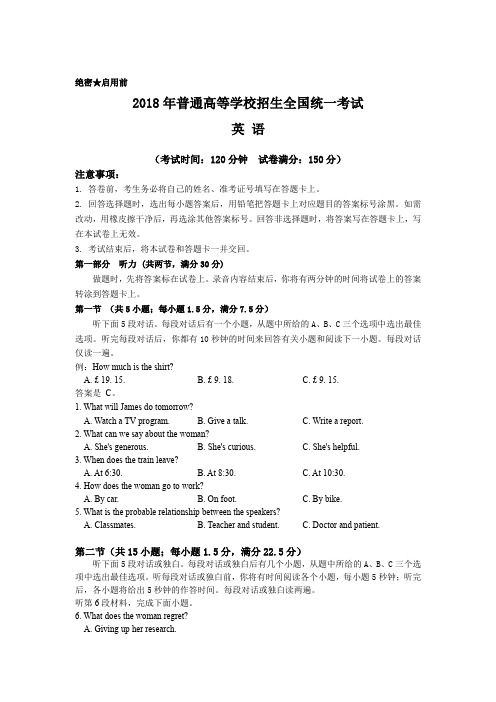
绝密★启用前2018年普通高等学校招生全国统一考试英语(考试时间:120分钟试卷满分:150分)注意事项:1. 答卷前,考生务必将自己的姓名、准考证号填写在答题卡上。
2. 回答选择题时,选出每小题答案后,用铅笔把答题卡上对应题目的答案标号涂黑。
如需改动,用橡皮擦干净后,再选涂其他答案标号。
回答非选择题时,将答案写在答题卡上,写在本试卷上无效。
3. 考试结束后,将本试卷和答题卡一并交回。
第一部分听力 (共两节,满分30分)做题时,先将答案标在试卷上。
录音内容结束后,你将有两分钟的时间将试卷上的答案转涂到答题卡上。
第一节(共5小题;每小题1.5分,满分7.5分)听下面5段对话。
每段对话后有一个小题,从题中所给的A、B、C三个选项中选出最佳选项。
听完每段对话后,你都有10秒钟的时间来回答有关小题和阅读下一小题。
每段对话仅读一遍。
例:How much is the shirt?A. £ 19. 15.B. £ 9. 18.C. £ 9. 15.答案是C。
1. What will James do tomorrow?A. Watch a TV program.B. Give a talk.C. Write a report.2. What can we say about the woman?A. She's generous.B. She's curious.C. She's helpful.3. When does the train leave?A. At 6:30.B. At 8:30.C. At 10:30.4. How does the woman go to work?A. By car.B. On foot.C. By bike.5. What is the probable relationship between the speakers?A. Classmates.B. Teacher and student.C. Doctor and patient.第二节(共15小题;每小题1.5分,满分22.5分)听下面5段对话或独白。
2018年高考英语全国卷 (I)听力试题与原文附录音下载
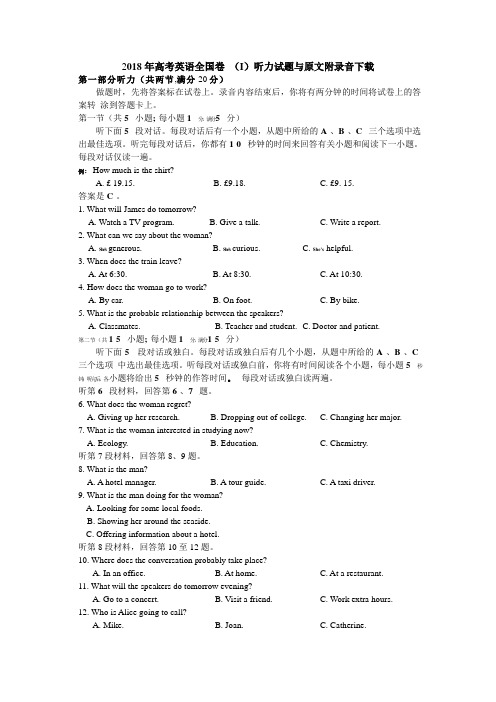
2018年高考英语全国卷(I)听力试题与原文附录音下载第一部分听力(共两节,满分20分)做题时,先将答案标在试卷上。
录音内容结束后,你将有两分钟的时间将试卷上的答案转涂到答题卡上。
第一节(共5小题;每小题1分,满分5分)听下面5段对话。
每段对话后有一个小题,从题中所给的A、B、C三个选项中选出最佳选项。
听完每段对话后,你都有10秒钟的时间来回答有关小题和阅读下一小题。
每段对话仅读一遍。
例:How much is the shirt?A. £ 19.15.B. £9.18.C. £9. 15.答案是C。
1. What will James do tomorrow?A. Watch a TV program.B. Give a talk.C. Write a report.2. What can we say about the woman?A. S h e’s generous.B. S h e’s curious.C. She’s helpful.3. When does the train leave?A. At 6:30.B. At 8:30.C. At 10:30.4. How does the woman go to work?A. By car.B. On foot.C. By bike.5. What is the probable relationship between the speakers?A. Classmates.B. Teacher and student.C. Doctor and patient.第二节(共15小题;每小题1分,满分15分)听下面5段对话或独白。
每段对话或独白后有几个小题,从题中所给的A、B、C 三个选项中选出最佳选项。
听每段对话或独白前,你将有时间阅读各个小题,每小题5秒钟;听完后,各小题将给出5秒钟的作答时间。
每段对话或独白读两遍。
2018年高考英语全国I卷听力原文之听力刚考词汇、句型详解
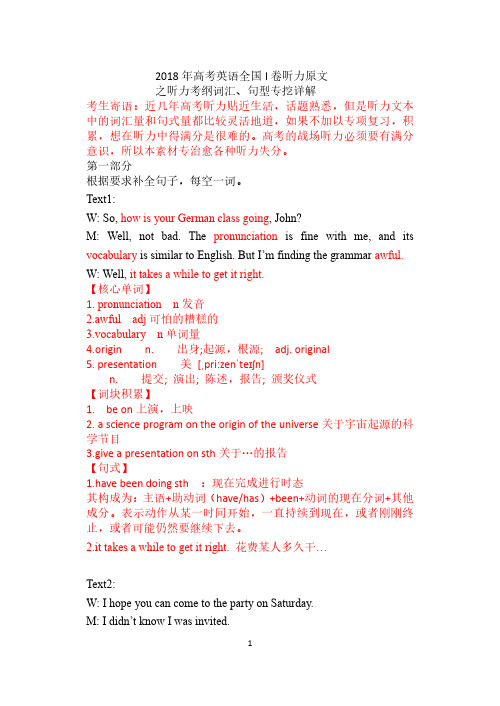
2018年高考英语全国I卷听力原文之听力考纲词汇、句型专挖详解考生寄语:近几年高考听力贴近生活,话题熟悉,但是听力文本中的词汇量和句式量都比较灵活地道,如果不加以专项复习,积累,想在听力中得满分是很难的。
高考的战场听力必须要有满分意识,所以本素材专治愈各种听力失分。
第一部分根据要求补全句子,每空一词。
Text1:W: So, how is your German class going, John?M: Well, not bad. The pronunciation is fine with me, and its vocabulary is similar to English. But I’m finding the grammar awful.W: Well, it takes a while to get it right.【核心单词】1. pronunciation n发音2.awful adj可怕的糟糕的3.vocabulary n单词量4.origin n. 出身;起源,根源; adj. original5. presentation 美[ˌpri:zenˈteɪʃn]n. 提交; 演出; 陈述,报告; 颁奖仪式【词块积累】1. be on上演,上映2. a science program on the origin of the universe关于宇宙起源的科学节目3.give a presentation on sth关于…的报告【句式】1.have been doing sth :现在完成进行时态其构成为:主语+助动词(have/has)+been+动词的现在分词+其他成分。
表示动作从某一时间开始,一直持续到现在,或者刚刚终止,或者可能仍然要继续下去。
2.it takes a while to get it right. 花费某人多久干…Text2:W: I hope you can come to the party on Saturday.M: I didn’t know I was invited.W:Sure you are. Everyone in our office is invited.【核心单词】1.order vt 订购;预定=reserve【词块积累】sell out卖光Text 3W: W'd better be going now, or we'll be late for the train.M: No rush. It's 8:30 now. We still have two hours.【词块积累】no rush:不用着急【句式】We'd better be going now.我们最好现在出发吧。
2018 高考英语全国一带答案解析听力原文
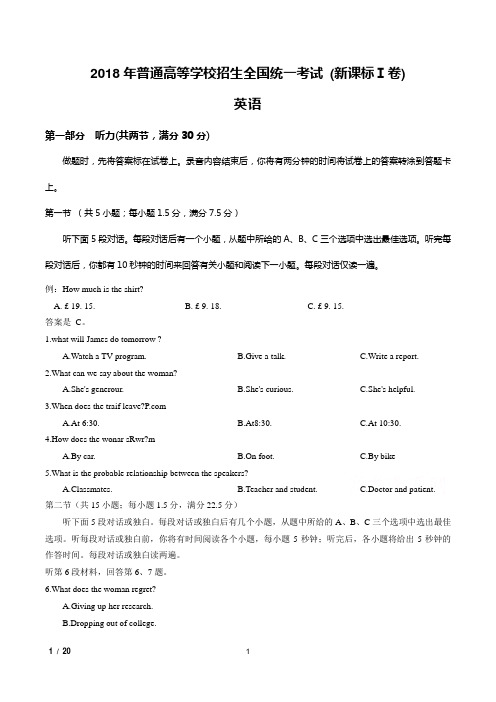
2018年普通高等学校招生全国统一考试(新课标Ⅰ卷)英语第一部分听力(共两节,满分30分)做题时,先将答案标在试卷上。
录音内容结束后,你将有两分钟的时间将试卷上的答案转涂到答题卡上。
第一节(共5小题;每小题1.5分,满分7.5分)听下面5段对话。
每段对话后有一个小题,从题中所给的A、B、C三个选项中选出最佳选项。
听完每段对话后,你都有10秒钟的时间来回答有关小题和阅读下一小题。
每段对话仅读一遍。
例:How much is the shirt?A. £ 19. 15.B. £ 9. 18.C. £ 9. 15.答案是C。
1.what will James do tomorrow ?A.Watch a TV program.B.Give a talk.C.Write a report.2.What can we say about the woman?A.She's generour.B.She's curious.C.She's helpful.3.When does the traif leave?A.At 6:30.B.At8:30.C.At 10:30.4.How does the wonar sRwr?mA.By car.B.On foot.C.By bike5.What is the probable relationship between the speakers?A.Classmates.B.Teacher and student.C.Doctor and patient.第二节(共15小题;每小题1.5分,满分22.5分)听下面5段对话或独白。
每段对话或独白后有几个小题,从题中所给的A、B、C三个选项中选出最佳选项。
听每段对话或独白前,你将有时间阅读各个小题,每小题5秒钟;听完后,各小题将给出5秒钟的作答时间。
每段对话或独白读两遍。
- 1、下载文档前请自行甄别文档内容的完整性,平台不提供额外的编辑、内容补充、找答案等附加服务。
- 2、"仅部分预览"的文档,不可在线预览部分如存在完整性等问题,可反馈申请退款(可完整预览的文档不适用该条件!)。
- 3、如文档侵犯您的权益,请联系客服反馈,我们会尽快为您处理(人工客服工作时间:9:00-18:30)。
2018年普通高等学校招生全国统一考试(全国I卷)1.What will James do tomorrow?A.Watch a TV program.B. Give a talk.C. Write a report.Text 1W: James, you’ve been watching TV for the whole evening. What’s on?M: It’s a science on the origin of the universe. I’ll give a presentation on it in my class tomorrow. 同义替换:give a presentation=give a talk2.What can we say about the woman?A.She’s generous.B. She’s curious.C. She’s helpful.Text 2M: Hello, do you have the best of Mozart?W: Um, sorry, we’ve just sold out, but we can order on for you. If you give us your number, we’ll call you when the CD arrives.内容概括3.When does the train leave?A.At 6:30.B. At 8:30.C. At 10:30.Text 3M: We’d better be going now. Or we’ll be late for the train.W: No rush. It’s eight thirty. Now we still have two hours.4.How does the woman go to work?A.By car.B. On foot.C. By bike.Text 4M: I am so tired of trying all those hours to work.W: Yeah, I know what you mean. I used to drive two hours to work each way. But now I live within walking distance of my office. I don’t even need a bike.反义替换:don’t even need a bike=on foot5.What is the probable relationship between the speakers?A.Classmates.B.Teacher and student.C. Doctor and patient.Text 5W: Hi, Andy, I didn’t see you in professor Smiths’ class yesterday. What happened?M: Well, I had a headache, so I called him and asked for sick leave.内容概括:人际关系听第6段材料,回答第6、7题。
6. What does the woman regret?A. Giving up her research.B. Dropping out of college.C. Changing her major.7. What is the woman interested in studying now?A. Ecology.B. Education.C. Chemistry.Text 6W: The biggest mistake I made, uh, was leaving college in my last year and not competing my education. So, I’m thinking of going back to school.M: School? To study what?W: Ecology, I’m interested in the relationship between humans and nature. Cool? Is it what you studied years ago? No, I majored in chemistry then.6.同义替换:leave college=drop out of college7.内容对应:ecology听第7段材料,回答第8、9题。
8. What is the man?A. A hotel manager.B. A tour guide.C. A taxi driver.9. What is the man doing for the woman?A. Looking for some local foods.B. Showing her around the seaside.C. Offering information about a hotel.Text 7M: Good morning, Madam. I am your guide for this trip.W: How lovely! Could you tell me about the hotel I’m going to stay at.M: Yes, of course! The Grand Hotel opened in nineteen ninety, and it sits on the seaside along the south coast highway. It is the most beautiful hotel here.W: That sounds great!M: And there are some restaurants outside. So at dinner time, you’d have a lot of choices. W: That’s really nice. I like to have some local food while traveling. What about the scenery around it?M: The hotel has the best views of the Pacific Ocean. Oh, I think I will love this hotel.8.内容对应:guide=tour guide9.内容概括听第8段材料,回答第10至12题。
10. Where does the conversation probably take place?A. In an office.B. At home.C. At a restaurant.11. What will the speakers do tomorrow evening?A. Go to a concert.B. Visit a friend.C. Work extra hours.12. Who is Alice going to call?A. Mike.B. Joan.C. Catherine.Text 8W: Hi, Mike.M: Hi, Alice. Nice to see you. You don’t often come here.W: I usually have fast food delivered to my office. I just came here for a change today. The environment here is good, clean and relatively quiet.M: And I heard the food is tasty. By the way, are you going to the concert tomorrow evening? W: Yes, are you?M: Yeah! Catherine was supposed to go with me, but she may have to work extra hours tomorrow. Do you know anyone who might like to go?W: No, but if you like, I can ask around or Joan might want to go. Oh, yes, she is a great fan of classical music. I’ll give her a ring after lunch.10.同义替换:come here + food=restaurant11.内容对应:concert12.内容对应:Joan听第9段材料,回答第13至16题。
13. Why does the woman meet the man?A. To look at an apartment.B. To deliver some furniture.C. To have a meal together.14. What does the woman like about the carpet?A. Its color.B. Its design.C. Its quality.15. What does the man say about the kitchen?A. It’s a good size.B. It’s newly painted.C. It’s adequately equipped.16. What will the woman probably do next?A. Go downtown.B. Talk with her friend.C. Make payment.Text 9W: Hi, I’ve only just arrived.M: Oh, good. Now, here are the keys. Let’s go in. There are two apartments. The one for rent is on the right. Do come in.W: Thank you. I like the carpet. The color is nice, is n’t it?M: Yes, and this apartment is in good condition. Here is your lounge (休息室).W: Where would we eat?M: There is, this corner here, or you can use your kitchen, come and see!W: The kitchen is quite small.M: Yes, but it has everything , cooker, fridge, even the dishwasher.W: And there are lots of cupboards.M: Let me show you the bedrooms. This is the smaller one.W: It’s a good size, though.M: Now come into the other bedroom. You can see the bathroom too.W: Yes, it is very nice. But I will have to ask my friend first and we will come together. I understand it is eight hundred dollars a month.M: Yes, but a few blocks downtown would be much more expensive.W: Well, thank you. I will be in touch.13. 内容概括,租房子14. 内容对应,the color is nice15. 同义替换,it has everything=it’s adequately equipped16. 同义替换,ask my friend=talk with her friend听第10段材料,回答第17至20题。
